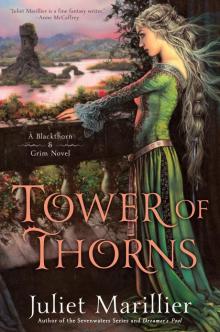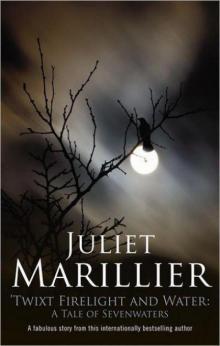- Home
- Juliet Marillier
The Well of Shades Page 52
The Well of Shades Read online
Page 52
“He’s asked this Brother Colm, the one we’ve heard so much about, to sit in on the meeting. I imagine it’s to offer an apology in person and to request that they accept a delay before their official audience. He’ll probably tell them Broichan isn’t here. You must at least wait until after that. A council of that kind is not something you can burst in on. Especially not if you plan to level some kind of accusation at Keother’s kinswoman. This is difficult enough for Bridei.”
“Feeler?” whispered Saraid. “Sing a song?”
“Later, Squirrel. You need your supper first.” He bent to kiss her cheek. His gut was churning; wrong, they’d got it wrong, he could feel it.
“I’m not coming to supper in the hall,” Elda said. “I’ll eat with these three, then bring them back here. If you’re quick, Faolan, Saraid may still be awake after you’ve eaten, and you can come and sing her a song. I didn’t know you had a talent for music.” She managed a smile. “Garth, you must sleep tonight. If the king asks you to stand guard, tell him I said you’re dead on your feet.”
Garth yawned widely. “The rate I’m going, I’ll be first to bed. Faolan, you and I need to eat, after such a day. I’ll come with you; wait for your moment, is my advice, and remember the king’s juggling more balls than a man can reasonably manage right now. He won’t want Keother offended.”
“If that girl’s lied and put Eile at risk, I’ll…” I’ll kill her. He remembered, just in time, that there were children in the room. “Squirrel,” he said, “I have to go and wash; I smell of horse.” Saraid sniffed at his sleeve and wrinkled her nose. “Saraid…” He hesitated, not sure whether to attempt the question again. She seemed prepared to talk now, and calmer than last night, but the look in her eyes troubled him. “Saraid, can you remember where Eile went? Can you tell me what happened yesterday, when I found you and Sorry in the woods?”
She gazed at him, solemn as an owl, then very deliberately shook her head.
“It would help Mama if you did tell. It might help us find her and Derelei. How did you get out there? Through the big gate or somewhere else?”
Her gaze did not waver. Her lips were pressed tightly together. At that moment, he saw Eile in her so strongly it made his heart turn over. Faolan sighed. “It’s all right, Squirrel,” he said. “Go and have your supper with the twins. I’ll be back as soon as I can. If you get tired, don’t try to stay awake for me. I’ll come and see you in the morning, before I go out again.”
“Sorry song? House on the hill?”
She was ready enough to speak of other things today. What was it that held her silent on the very matter he most needed to know? A threat of some kind? The child was only three. “I’ll sing the Sorry song,” Faolan told her. “House on the hill is the one Mama does.” His throat went tight. “When she comes home, she’ll tell it for you.”
“Promise?”
He could not look at her. “Promise,” he whispered, then set her down on the pallet and, like a coward, fled.
“I’M BALANCED ON a knife edge,” Bridei said to Fola. “Every day I give these Christians house room, every time I listen to their arguments, every concession I grant them offends the ancient gods of Fortriu more deeply; the gods in whose hands rests the fate of my little son. Every step I take in that direction puts Tuala at further risk. You know what I did when I stopped the ritual at the Well of Shades. I set my whole family on a path of constant peril.”
“But?” Fola was standing by the hearth, serene in her gray robe. She watched Bridei, who was pacing up and down with Anfreda in his arms.
“But I know, in practical terms, that change is coming. One of the reasons Keother is here is to make an argument on behalf of the Christian elements in his own kingdom. And he wants to rebuild bridges with me after his woeful failure to support me against the Gaels. For all his bluster, he cannot afford to do otherwise. His territory is isolated; he’d be a fool to detach himself still further. Where matters of faith are concerned, he’ll put his position still more strongly with these emissary clerics here at court. As king of Fortriu I must at least hear him. If Faolan’s wrong about Carnach, I could have a powerful new enemy on my doorstep. I need Keother fully on my side.”
“So you cannot placate the gods by sending these Christians packing. But you do not want to listen to them now.”
“How can I turn my full attention to anything while Derelei’s gone? And Tuala; I’m frightened for her, Fola. She’s never tried this before. The gods could snatch away the two of them so easily. What have I wrought here?”
The wise woman regarded him levelly. “Keep on in this vein,” she remarked, “and that baby will be fretful and unsettled all night. If you insist on holding her, use the skills Broichan taught you to make yourself calm. You can’t walk into this meeting looking wild-eyed and jittery. Sit down. Now let us imagine we are back in the past: living again the night of the Gateway sacrifice, the only one you ever witnessed. Think of the moment when you decided that, should you become king, you would bring an end to that particular rite and take the burden of the Nameless God’s wrath on your own shoulders. You knew you would wed and likely father children. You knew the risk. If you could live that moment again, would your decision be different?”
There was no need to consider this. Bridei shook his head. The dark images of that night, the bleak echoes of the Well of Shades and a girl drowning, a white-clad girl whose long hair had floated out on the black water, were never far from his thoughts. He could hear Broichan chanting, his voice full of a terrible, Otherworldly power; he could see the blanched faces of the men; he could feel his own hands helping to ensure the death of the innocent. “I wish only,” he said, “that for their retribution the gods would choose me and me alone. Not Tuala; not Derelei. They are blameless.”
“The Shining One loves Tuala,” said Fola. “And Derelei, so small and so prodigiously gifted, is surely marked out for a special path in life. I cannot think the gods would let that go to waste. You must not give up hope, Bridei. Your wife is a strong woman. She seemed to have faith in her ability to achieve her mission. You, too, should have faith.”
“I do,” he said, not quite sure if he believed this. “And yet I fear the dark god’s vengeance. I fear the choices that lie before me. As king, there is a path I wish to follow, a path of compromise, of conciliation. My love for the gods is sure and unwavering. That will never falter, not in all the nights and days I walk this earth. I intend to keep the ancient ways strong in Fortriu. But I must also rule with a view to political change, Fola. There are powers at work all around us: a new king in Circinn; a precarious peace in Dalriada; the mysterious and changeable influence of the Caitt. I do not forget the Uí Néill chieftains, full of ambition and only a day or so’s sailing from our western shores. I cannot take a strong and wise path forward for Fortriu if I am constantly fettered by fear for my loved ones; by terror of the darkness that resides within me, and within any man who walks the lands of the Priteni. The Nameless God is part of us all. We cannot escape him. Tonight, all I want to do is stay here in this chamber, holding my daughter and hoping Tuala and Derelei will walk in the door, safe and sound. I do not want to speak to Keother or to these missionary Christians. I don’t even want to see Tharan and Aniel, staunch supporters though they have been. Tonight, I am not much of a king.”
“And me?” she asked wryly.
Bridei smiled at her. “For being here to watch over my daughter, I can never thank you enough,” he said. “I hope you know you are always welcome with Tuala and me. I was going to say you are like a mother to us, but I know you would dismiss that. It’s not quite right, anyway. You are both respected teacher and beloved friend. Your wisdom and honesty help keep us on a straight path.”
Fola said quietly, “I’m not sure I merit such praise, but it warms me. In my turn, I would tell you that it is at times such as this, when you feel wrenched apart and helpless, that you discover what it means to be a king. You are a king to your very core, Bridei, st
rong of heart, wise and brave. And human. That’s part of what makes you so good at the job. Now it’s time for you to go. If it will reassure you, I will fetch out Tuala’s scrying bowl once the baby’s been settled for the night and see what the gods can tell me. You know, of course, that they may have ill visions for us, or none at all.”
“I know.” He transferred the drowsy Anfreda to the wise woman’s arms. “Thank you, I would welcome that.”
“I can do it soon enough. This one’s due to be fed shortly, then I’ll let Tresna go to her supper. I may have some wisdom for you before you sleep.” Her tone was full of compassion; she had known Bridei since he was a lad of twelve.
“I won’t sleep, not tonight. Not with the two of them in peril. Eile, too. I intend to keep a vigil. To pray.”
“Alone?”
“My men are exhausted. You must stay here; Broichan is gone. Yes, alone.”
“Bridei, do you credit this tale of Eile, which seems more plausible as time passes? Do you believe she would do such a terrible thing out of zeal for a cause, or from desperation?”
Bridei shook his head. “I know circumstances drive folk to extremes. But there is one aspect of that story I cannot believe: that Eile would go away and willingly leave her daughter behind. The bond between them is iron-strong. The truth does not lie in this tale of kidnap but elsewhere. Besides, I have unshakable faith in Faolan’s good judgment. I know Tuala would agree with me.”
“As do I. Once or twice in my life I’ve encountered a soul who is good through and through; such folk shine like lamps in a morass of doubt and uncertainty. Eile is one such individual. In time, I suspect her daughter will become another. Your Faolan is a fortunate man.”
“That’s if he finds her,” said Bridei grimly.
THE MEETING WAS awkward. Keother, weary after the day’s search, was quieter than usual. He greeted Colm with deference and answered the cleric’s queries as to the state of the monastic settlements in the Light Isles, a topic Bridei had hoped would not be aired until the formal audience. Colm was an impressive man, perhaps forty years of age, tall, ascetic in appearance, with the unmistakable stamp of his Uí Néill breeding, the eyes bold, the nose jutting, the jaw firm. The high frontal tonsure served to emphasise the Gael’s strong, domed brow. His innate authority was clear in his every gesture. His voice was somehow both stern and beguiling, a powerful tool of influence.
Bridei had a sound grasp of the Gaelic language and could speak it with reasonable fluency, thanks to Wid’s tuition in his early years. He seldom revealed this ability, and never in such situations as this. Had Faolan not been off rearranging the night guards, he’d have used his right-hand man as both protector and translator. As it was, Keother’s two men-at-arms were the only minders present, and it was Brother Suibne who rendered the conversation into Gaelic and back again. Bridei knew him of old. An astute man, clever, subtle, and possessed of a dry sense of humor. For all their differences, Bridei liked him. But you could never trust a Christian, not fully. Bridei listened closely to both original and translation, knowing how slight the nuance required to cause a major misunderstanding. That, too, was something he had learned from Wid.
Aniel, well prepared, proposed a day and time for the formal audience and suggested all parties give him an idea, in advance, of what matters they wished discussed there. He stressed that, although the delay might inconvenience the brothers, all the amenities of White Hill would be open to them in the interim.
“On the understanding, of course,” Bridei put in, “that there will be no public prayer or religious teaching within these walls. We have tolerated your progress across Fortriu, word of which has reached us by various messengers. A journey attended by dramatic encounters and wondrous deeds, we are told. It is a long way; a taxing experience. It seems to me it would be wise of you to allow for recovery before you must repeat it. Eat, drink, rest. Take time for yourselves.”
Brother Suibne altered this subtly on relaying it to Brother Colm. Somehow, the opportunity for recovery became less a matter of good beds and fine food, and more one of time to pray and reflect in this season of change. Perhaps that was a wise mistranslation. Colm agreed, with visible reluctance, to the delay.
“Also,” said Aniel, “should this matter of the king’s son develop in any way unexpectedly, Bridei may need to delay the audience longer or to cancel it.”
Colm raised his brows as Suibne rendered this.
“The fact is,” said Tharan, “we don’t know if we’re dealing with a mishap or an abduction. If your own countrymen are involved and we need to exert pressure to have the child returned, you may find yourselves enjoying White Hill’s hospitality for longer than you intended. King Bridei has authorized me to tell you this.”
Suibne translated Colm’s reply. “We do not condone the abduction of children. We appreciate your candor and will pray for the boy’s safe return. If King Bridei wishes, Brother Colm says he will keep vigil by the king’s side tonight and offer up prayers for the child. What is his name?”
“Derelei.” Bridei found it hard to get the word out. “Thank Brother Colm from me. I know he means well. There is no need for him to lose sleep over this.”
They spoke of other matters. It was clear Colm wished the formal audience to cover assurances of safety for the Christian hermits of the Light Isles, not just from Keother but from Bridei as Keother’s overlord. Then there was a question of Gaels whom Colm had seen among the serving people at White Hill. He wished to know the fate of last autumn’s captives, those of the defeated Dalriadans who had come here in Priteni custody. How many were slaves? What would their future hold? What of the fate, in the longer term, of Gabhran, deposed king of the Dalriadan Gaels, now locked up in his own old stronghold of Dunadd?
The list was thorough. Bridei remembered that this man, as an Uí Néill, was kin to Gabhran. It was powerfully apparent to him, even through the fog of exhaustion and anxiety, that when the formal audience did take place it would range far beyond matters of religion. He began to revise his idea of exactly why this Colmcille had made his arduous journey all the way to the heart of Fortriu.
“And lastly,” Brother Suibne said, “there will be a matter of which you already know; the matter central to our mission. It concerns the island of Ioua, in your westernmost territory. We visited that place. It is beautiful, remote, and wild, with few inhabitants. We have hopes you will reconsider those words you spoke at the moment of victory over Gabhran’s forces last autumn. We have hopes you may, after all, grant us sanctuary in that place.” It was a more poetic, and humbler, rendition of his superior’s closing speech.
“You are a clever translator, Brother Suibne,” Bridei said.
“And you an astute listener, my lord king.” Suibne smiled. “I’m so sorry about your boy. How is your wife taking it? I remember her from Caer Pridne. A fey, small thing, but strong-hearted. I assume it is the same.”
“Tuala. Yes. I cannot speak of this here. But I thank you for your concern.”
They were seated in a chamber not far from the Great Hall, in order to be able to continue talking until the meal was about to be served. Bridei had become aware, over the course of the last few interchanges, that there was a level of disturbance outside well beyond anything one might have expected: shouts, scuffling, many voices raised. He thought perhaps one of them was Faolan’s.
“Tharan,” he said calmly, “you’d best go out and discover what that is about. Take one of the guards.” Then, turning to his guests, “We’ll go to supper shortly. I regret that my court druid, Broichan, is unable to be with us tonight. He is currently away from White Hill. I hope he will be able to join us for our official discussions. It is another reason a delay will aid us.”
“You hope?” Colm raised his brows. “Cannot you command his return? I’m told Broichan wields great power within Fortriu and strong influence here at your court. My belief is that he should be present.”
“I am my own man,” Bridei said quietly, us
ing one of Broichan’s techniques to set his anger aside. “Broichan is one of those who advise me. Where the welfare of my people is concerned, the final decisions are mine. Does the high king in your homeland command your movements, Brother Colm?”
The translation provoked a wintry smile. “What can I say?” was Suibne’s rendition of the reply. “He is in Tara, and I am here in heathen Fortriu.”
It was at that moment Bridei decided that either Suibne was too clever for his own good, or Colmcille was no different from the rest of them: for all his miracle-working, a real human being.
“Then welcome to Fortriu,” he said. “Now let us go to supper—”
The door opened and Tharan came back in, his features carefully arranged into an expression of calm. “My lord king,” he said, “there’s something of a… spirited discussion taking place among those in the hall awaiting their meal. It involves Lady Breda and certain accusations. And also—”
Keother was on his feet. “I’ll deal with it,” he said, “if I may be excused.”
“—the matter of Eile, and the search,” Tharan went on. “This requires your personal intervention, my lord king.”
Bridei could hear Faolan shouting. “Very well, we’ll go through,” he said, wishing he could achieve Tharan’s self-control. “Brother Colm, Brother Suibne, it will be best if you remain here until this is dealt with. I regret the inconvenience.” He nodded to the remaining guard to stay with the Christians. The shouts were getting louder; he could hear Breda, her voice rapidly rising. And one of Talorgen’s boys. Abandoning protocol, the king of Fortriu strode out the door and down the passageway to the Great Hall.
There was no way to tell exactly what was going on. The hall was full of folk, and ale had been served while they waited for their supper. Most were seated, but Faolan was on his feet, pointing an accusatory finger at Breda. He was enraged; his face was flushed, his scowl thunderous. Whatever this was, it must be serious to rob Bridei’s self-disciplined spy of his well-known equanimity in public. At the king’s table Breda, too, was standing, hands on hips, head high, her elegant attire a stark contrast to the shrillness of her voice.

 Den of Wolves
Den of Wolves Flame of Sevenwaters
Flame of Sevenwaters Blade of Fortriu
Blade of Fortriu Wildwood Dancing
Wildwood Dancing Dreamer's Pool
Dreamer's Pool Raven Flight
Raven Flight Heir to Sevenwaters
Heir to Sevenwaters The Dark Mirror
The Dark Mirror Daughter of the Forest
Daughter of the Forest Seer of Sevenwaters
Seer of Sevenwaters Tower of Thorns
Tower of Thorns Shadowfell
Shadowfell Wolfskin
Wolfskin The Caller
The Caller Foxmask
Foxmask Harp of Kings
Harp of Kings The Well of Shades
The Well of Shades Heart's Blood
Heart's Blood Child of the Prophecy
Child of the Prophecy Twixt Firelight and Water
Twixt Firelight and Water A Dance with Fate
A Dance with Fate The Harp of Kings (Warrior Bards)
The Harp of Kings (Warrior Bards) Daughter of the Forest (The Sevenwaters Trilogy)
Daughter of the Forest (The Sevenwaters Trilogy)![Sevenwaters [06] Flame of Sevenwaters Read online](http://i1.bookreadfree.com/i2/04/08/sevenwaters_06_flame_of_sevenwaters_preview.jpg) Sevenwaters [06] Flame of Sevenwaters
Sevenwaters [06] Flame of Sevenwaters![[Sevenwaters 04] Heir to Sevenwaters Read online](http://i1.bookreadfree.com/i2/04/12/sevenwaters_04_heir_to_sevenwaters_preview.jpg) [Sevenwaters 04] Heir to Sevenwaters
[Sevenwaters 04] Heir to Sevenwaters